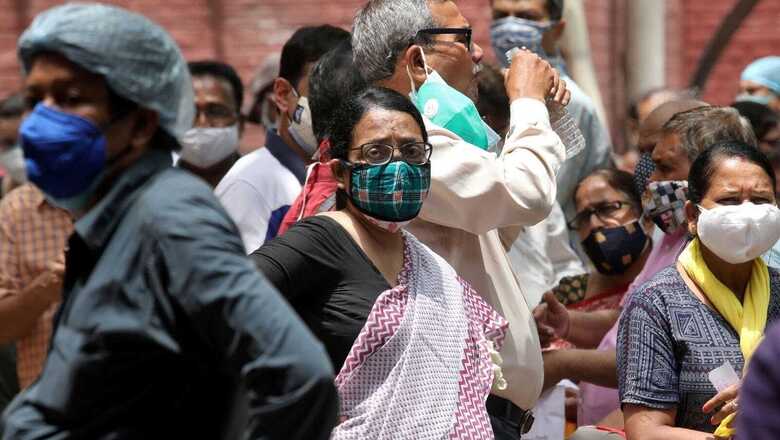
views
Things don’t seem to be going too well for Kerala. The state hailed for its effective strategies to combat the second wave of Covid-19 is now seeing a resurgence in cases, with a latest serosurvey by the Indian Council of Medical Research (ICMR) done between June 14 and July 6 pointing that Kerala has least Covid antibodies at 44.4 per cent.
The steady rise in infections in southern Kerala is posing a big challenge to the state’s overstretched health system and exposing the government to opposition attacks. Kerala was the first state to report a Covid case in the country in January 2020 and the pandemic has shown no signs of abating here in the last three months, health ministry statistics show. As the Union Health Ministry sounded the alarm, News18 breaks down Kerala’s battle with the pandemic.
Where does Kerala stand?
The intensity of surge in Kerala can be gauged when compared with the situation in the neighbouring states. Cases in Tamil Nadu have come down from 20,421 on June 6 — the last occasion when any Indian state reported more than 20,000 infections — to 1,767 cases on Tuesday. Karnataka, which witnessed a high volume of cases in April-May, only reported 1,501 new cases on Tuesday with a TPR of 1.46%. Kerala, on the other hand, continues to report a high number of cases, which have now crossed 3.3 million, second only to Maharashtra which has a caseload of 6.2 million.
The fourth round of the sero survey conducted by the Indian Council of Medical Research showed antibody prevalence was 67. 7% nationally but it was only 42.7 % in Kerala, meaning a huge chunk of its population is still susceptible to the virus.
What made the situation worse?
The state has a high density of population (859 people per sq km), a large number of elderly population (at least 15% are above 60 years of age) and high volume of lifestyle diseases such as diabetes, which have made its battle with coronavirus harder. Experts quotes by Hindustan Times said low testing rate, obsession with rapid antigen tests and over dependence on bureaucracy was among the reasons responsible for slowing down Kerala’s fight against the pandemic.
While there has been no shortage of oxygen or beds, the health system in the state is still overburdened. Compared to last week, there was a 14% hike in demand for beds and 80% of Covid beds were occupied this week, health ministry statistics show. Ten of the 30 worst Covid affected districts in the country are in the state. Malappuram tops the chart with 4,037 active cases.
What experts say
While many have faulted the government’s policies for the rapid rise in cases, some point to the fact that the spike is not a steep rise.
Another possibility is that because previous serosurveys had shown that the average number of people who have COVID-19 antibodies in Kerala is only half of the national average, there are many “hitherto uninfected pockets”. People may be getting infected here and sustaining the high numbers, Gautam Meon, professor of physics and biology at Ashoka University told IndiaSpend.
These experts said that while Kerala’s better case management is negating the greater transmissibility of the Delta variant of the coronavirus, the state should still be cautious as the virus’s R0 number – how many people can be infected by a single patient – is greater than 1, meaning more than one person is being infected.
The government’s stand
Chief Minister Pinarayi Vijayan has put up a brave face, saying the situation is under control. “Second wave started late in the state and about 50% of the state population are yet to contract the virus. So we expected this increase,” he said. He said there was a shortage of vaccines which was delaying the state’s universal inoculation programme.
In an interview, state Health Minister Veena George said the trend was “not unusual”. “Kerala has been following the same pattern during the first wave too. The state accounted for almost 40 percent of the country’s total Covid cases in January while overall numbers were on a decline. We have anticipated this. The second wave of the Covid-19 pandemic was delayed in Kerala compared to other states. We saw the peak on May 12, when the caseload was at 43, 500. Now we have reached a plateau and we expect the curve to come down in two weeks,” she told Outlook.
Opposition sharpens claws
The assurance, however, has not gone down well with the Opposition, with several leaders slamming the government’s decision to relax lockdown norms for Bakrid. Taking a dig at the ‘Kerala model’, BJP leader Sambit Patra said that 50 per cent of the COVID-19 positive cases in the country are from Kerala and pinned the blame on Bakrid relaxations. “50% of the COVID positive cases in the country comes from Kerala, thanks to the Eid relaxations. But as expected the narrative would always be built around a Kumbh or a Kawar Yatra. Hmmm …Kerala Model,” he said in a tweet.
BJP’s Amit Malviya also slammed the Pinarayi Vijayan government saying, “Eid relaxation is coming home to roost. Silence of the secularists is deafening.”
Opposition leader V D Satheesan said: “Its lies are falling flat. The government fudged data to give a rosy picture but now skeletons are tumbling out of its cupboard. The RTI reply we received shows more than 7,316 [Covid] fatalities were not accounted for. And its Covid stimulus package [has] turned out to be a big farce.”
What is the centre doing?
The Centre will send yet another team of experts to Kerala to monitor the situation. Sources said that the health secretary has written to the state government expressing concern over containment measures being followed and also stressed the need for preventing mass gatherings.
A central team had visited the state in the first week of July and had expressed satisfaction over the containment measures the state has been following. However, there is no respite in cases being reported after that.
Read all the Latest News, Breaking News and Coronavirus News here.















Comments
0 comment